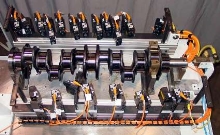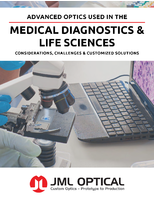Laser System reveals invisible surface finish.
Press Release Summary:

Class II, CE-certified OPTI-Scan can be configured to check any machined part surface and render go/no-go signal. It utilizes lasers arranged around part fixture, each aimed at machined surface of workpiece. System is first shown pre-finished master part and then properly finished master part. Quality of reflected light indicates whether surface has been correctly finished, and results are instantly displayed on control panel.
Original Press Release:
New Laser Checking System Reveals 'Invisible' Surface Finish
Providing a cost-effective, foolproof way to prevent improperly finished precision parts from entering an assembly, IMPCO Machine Tools introduces a system of Class II CE-certified laser heads to final inspect the surface finish of precisely machined parts, such as crankshafts or transmission shafts, in just seconds. The system, called OPTI-Scan, can be configured to check any machined part surface and render a go/no-go signal. The process adds no time to production cycles yet permits 100% checking.
"Because it is impossible to distinguish finely machined surfaces with the naked eye, we developed the OPTI-Scan laser checking system as a cost-effective method for 100% checking whether a precision surface has been properly machined," said an IMPCO spokesman. OPTI-Scan can be installed within a machine tool or as an off-line check.
OPTI-Scan utilizes lasers arranged around a part fixture, each aimed at a machined surface of the workpiece. The system is first shown a pre-finished master part and then shown a properly finished master part in order to 'see' the difference. The quality of the reflected light indicates whether a surface has been correctly finished. Results are instantly displayed on a control panel. IMPCO developed the software.
In one of the first applications, installed as a station in a production microfinishing machine, an OPTI-Scan system uses 21 laser heads to check all machined journal surfaces of a 6-cylinder diesel engine crankshaft in less than 2 seconds. The engine producer will use the system to assure that all surfaces are finished before the crankshaft proceeds to assembly.
It would normally take up to an hour using conventional contact gaging to check the main and pin journals on a crankshaft and would require the parts to be laboratory-clean contact gaging to produce micro readings. Contact gages are able to detect and actually measure surface finish, but they are extremely expensive and are for lab use.
With OPTI-Scan, surfaces do not need to be cleaned before checking. OPTI-Scan is shop-hardened, very economical, and simple to install and control or reconfigure as needed for different parts. According to IMPCO, it operates reliably in typical shop dirt, oils, and mists.
"Precision journals, as on a crankshaft, are finished to submicron accuracy, and it is impossible to assure visually that they have been processed, yet it is essential that properly finished components are released for assembly into an engine or the engine will fail prematurely" said the IMPCO spokesman.
IMPCO Machine Tools is a world leading designer of microfinishing machines and systems based in Lansing, Michigan, with global licensees. It has pioneered the development of the microfinishing process, considered the ultimate material removal process, for more than 50 years and operates a state of the art metrology lab.




